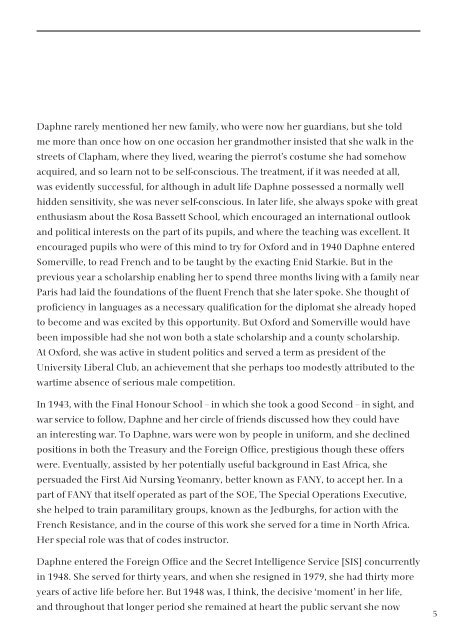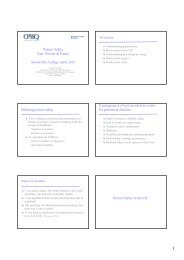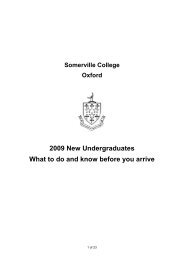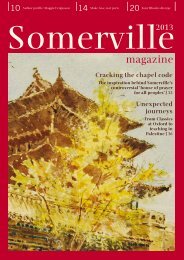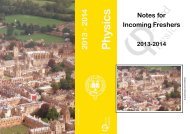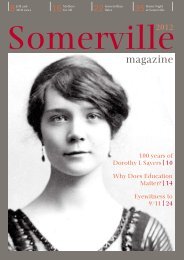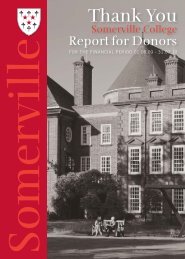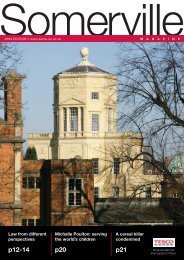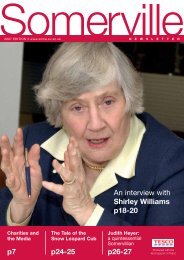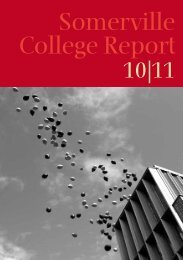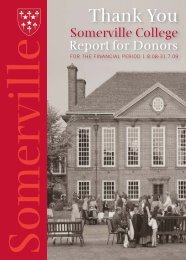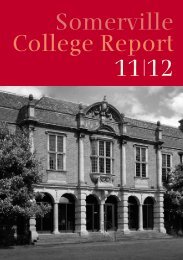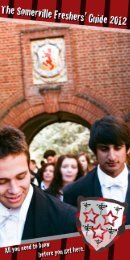Address given by Miss Barbara Harvey at theFuneral of <strong>Daphne</strong> <strong>Park</strong>in the Chapel of <strong>Somerville</strong> <strong>College</strong>, 6 April 2010DAPHNE PARK WAS REMARKABLE in her generation; and since she wished always tobe judged by the highest standards, I will add that my ‘generation’ includes men as well aswomen. The situations which made her a legend in her own lifetime were often complexand dangerous. But her philosophy of life was simple, a matter of three words: ‘Life is fun’.For her, life was fun precisely because it was challenging, and she found deep satisfactionin responding with all her formidable powers. Indeed, she was rather unhappy if the nextchallenge was not in sight; she liked to be ‘flat out’. When, on my last visit to her, justbefore she entered hospital, she said that she was feeling ‘rather bored’, I knew how ill shemust be, for <strong>Daphne</strong> and boredom had always been strangers to each other.4The challenges began to appear when <strong>Daphne</strong> was very young. Until she was nearlyeleven, she lived with her mother who ran, but did not herself own, a coffee plantationin the highlands of what was then Tanganyika though later part of Tanzania. Her fatherpanned for gold some distance away, and <strong>Daphne</strong> and her mother could expect to seehim three or four times a year. Books, however, were sent by relatives in England, andwhen she was old enough to do this, <strong>Daphne</strong> read to her mother, whose reading sighthad failed. <strong>Daphne</strong>’s favourite <strong>book</strong> at this time was Huckleberry Finn, and her favouriteauthor John Buchan, who perhaps implanted in her mind the first seeds of the ideathat a career in Intelligence would be exciting. Her formal education consisted of acorrespondence course run from Dar-es-Salaam by the daughter of the Anglican bishopin Tanganyika, for children in <strong>Daphne</strong>’s situation. But now the decision was made tosend <strong>Daphne</strong> to England, to live with her grandmother and two great-aunts in southLondon and attend the Rosa Bassett School, a state secondary school, in Streatham. Sheowed this life-changing opportunity to her teacher in Dar-es-Salaam, who wrote to hermother to say that such a clever child must go to school. But she owed also a great dealat this point to her mother, whose savings, though not large, provided the money neededfor the journey to England. She travelled in the care of some friends of her parents whowere making this journey. The first part of the journey, to Dar-es-Salaam, included alorry ride, and <strong>Daphne</strong> never forgot the cloud of locusts on the way: there were, sheremembered fifty years later, locusts in your ears, locusts in your eyes, and locusts onyour face. Lack of funds and the 1939-45 War made it impossible for <strong>Daphne</strong> to seeher mother again for fifteen years or her father for an even longer period; her youngerbrother, who died at the age of fourteen, she never saw after leaving Africa.
<strong>Daphne</strong> rarely mentioned her new family, who were now her guardians, but she toldme more than once how on one occasion her grandmother insisted that she walk in thestreets of Clapham, where they lived, wearing the pierrot’s costume she had somehowacquired, and so learn not to be self-conscious. The treatment, if it was needed at all,was evidently successful, for although in adult life <strong>Daphne</strong> possessed a normally wellhidden sensitivity, she was never self-conscious. In later life, she always spoke with greatenthusiasm about the Rosa Bassett School, which encouraged an international outlookand political interests on the part of its pupils, and where the teaching was excellent. Itencouraged pupils who were of this mind to try for Oxford and in 1940 <strong>Daphne</strong> entered<strong>Somerville</strong>, to read French and to be taught by the exacting Enid Starkie. But in theprevious year a scholarship enabling her to spend three months living with a family nearParis had laid the foundations of the fluent French that she later spoke. She thought ofproficiency in languages as a necessary qualification for the diplomat she already hopedto become and was excited by this opportunity. But Oxford and <strong>Somerville</strong> would havebeen impossible had she not won both a state scholarship and a county scholarship.At Oxford, she was active in student politics and served a term as president of theUniversity Liberal Club, an achievement that she perhaps too modestly attributed to thewartime absence of serious male competition.In 1943, with the Final Honour School – in which she took a good Second – in sight, andwar service to follow, <strong>Daphne</strong> and her circle of friends discussed how they could havean interesting war. To <strong>Daphne</strong>, wars were won by people in uniform, and she declinedpositions in both the Treasury and the Foreign Office, prestigious though these offerswere. Eventually, assisted by her potentially useful background in East Africa, shepersuaded the First Aid Nursing Yeomanry, better known as FANY, to accept her. In apart of FANY that itself operated as part of the SOE, The Special Operations Executive,she helped to train paramilitary groups, known as the Jedburghs, for action with theFrench Resistance, and in the course of this work she served for a time in North Africa.Her special role was that of codes instructor.<strong>Daphne</strong> entered the Foreign Office and the Secret Intelligence Service [SIS] concurrentlyin 1948. She served for thirty years, and when she resigned in 1979, she had thirty moreyears of active life before her. But 1948 was, I think, the decisive ‘moment’ in her life,and throughout that longer period she remained at heart the public servant she now5
- Page 1: Daphne Park1921-2010MEMORIALTRIBUTE
- Page 4 and 5: ContentsForeword by Dr Alice Procha
- Page 8 and 9: ecame, the servant of a country tha
- Page 10 and 11: Nevertheless, these stories are maj
- Page 12 and 13: Conservative policies. Having recei
- Page 14 and 15: ifle. Nevertheless, his young wife
- Page 17 and 18: SchoolIN HER OWN WORDS:I LOVED SCHO
- Page 19 and 20: presented the play, I duly delivere
- Page 21: War ServiceFrom the Profile of Daph
- Page 24 and 25: The Secret Intelligence ServiceMemo
- Page 26 and 27: to exercise it. Nevertheless much s
- Page 28 and 29: say, as a conservative cross benche
- Page 30 and 31: Daphne, this moral dimension of hum
- Page 32 and 33: The following accounts of some of D
- Page 34 and 35: On June 30, 1960, independence was
- Page 36 and 37: that there would be a lot of armed
- Page 38 and 39: it. Weevils and worms used to come
- Page 40 and 41: leave, and the Mongols would supply
- Page 43 and 44: thought, slightly amused Miss Marpl
- Page 45 and 46: one or the other type, millionaires
- Page 47 and 48: she gave to the New Yorker in 1989,
- Page 49 and 50: Even better, of course, was really
- Page 51: Wolfson during the afternoon with a
- Page 54 and 55: DAPHNE WAS THE PRINCIPAL OF THE COL
- Page 57 and 58:
Member of the Sheffield Development
- Page 60:
Somerville CollegeOxford OX2 6HDTel


